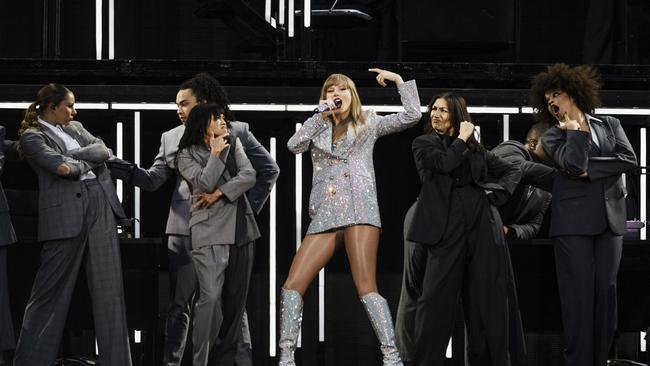‘It is time to break up Live Nation-Ticketmaster’: US Justice Department sues world’s largest entertainment company
The US Department of Justice has filed an anti-trust lawsuit against the world’s largest entertainment company. US fans faced delays and claimed high prices for Taylor Swift concerts.

The world’s largest entertainment company is being sued by the US government, which claims the entertainment giant is unlawfully monopolising the industry and harming fans, performers, venues and promoters in the process.
The civil anti-trust lawsuit was filed against Ticketmaster’s parent company, Live Nation Entertainment, by the US Department of Justice and 30 state and district attorneys-general. It was dismissed as “absurd’’ by the company.
The DOJ has alleged US music fans have been “deprived of ticketing innovation and forced to use outdated technology”, while paying higher prices for tickets than other countries.
The company came under intense scrutiny during the sales of Taylor Swift’s Eras Tour last year, where US fans reported being left waiting in queues for hours only to later be kicked out as the website crashed.
In a statement to social media last year Swift said she’d asked Ticketmaster “multiple times” if they could handle the demand, and was “assured they could”.
“It’s truly amazing that 2.4 million people got tickets, but it really pisses me off that a lot of them feel like they went through several bear attacks to get them,” she wrote.
US Attorney-General Merrick B. Garland has claimed it’s time to “break up” the hold Live Nation and Ticketmaster hold on the industry almost 15 years on from their merger under the Obama administration.
“We allege that Live Nation relies on unlawful, anti-competitive conduct to exercise its monopolistic control over the live events industry in the United States at the cost of fans, artists, smaller promoters, and venue operators,” he said.
“The result is that fans pay more in fees, artists have fewer opportunities to play concerts, smaller promoters get squeezed out, and venues have fewer real choices for ticketing services.
“It is time to break up Live Nation-Ticketmaster.”

In the complaint, the DOJ states Live Nation controls about 60 per cent of concert promotions at major concert venues across the US, while directly managing more than 400 artists.
The document also said Live Nation owns or controls more than 60 of the top 100 amphitheatres in the US, and owns or controls more than 265 concert venues in total across North America.
The giant also controls at least 80 per cent of major concert venues’ primary ticketing for concerts.
The lawsuit alleges Live Nation also pressured artists into using their services and used threats and retaliation to squash competition from smaller promoters.
Justice Department antitrust division Assistant Attorney-General Jonathan Kanter alleged the US live music industry was “broken” as a result of Live Nation, with the lawsuit hoping to “restore competition for the benefit of fans and artists”.
“The live music industry in America is broken because Live Nation-Ticketmaster has an illegal monopoly,” he said.
However Live Nation’s executive vice-president Dan Wall called claims of monopoly power “absurd”, adding the action will not reduce ticket prices or service fees.
“It ignores everything that is actually responsible for higher ticket prices, from increasing production costs to artist popularity, to 24/7 online ticket scalping that reveals the public’s willingness to pay far more than primary tickets cost,” he said in a statement.
Mr Wall also said the lawsuit was a result of “intense political pressure” on the DOJ.
Live Nation’s merge with Ticketmaster was approved in the US in 2010 by the Obama administration, which Mr Wall said the DOJ can’t just “shrug off”.
He said “as admitted, (the DOJ) could not prove even a likelihood of anticompetitive effects” at the time of the merger.
“And even in this complaint, DOJ does not contend the merger was unlawful. It is just pandering to the crowd with a request for relief that, in my opinion, it cannot possibly hope to achieve under these circumstances,” Mr Wall said in a statement.





To join the conversation, please log in. Don't have an account? Register
Join the conversation, you are commenting as Logout